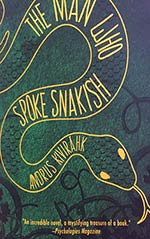
![]() charlesdee
charlesdee
12/25/2015
![]()
Leemet is a young man of the forest people. When he was a child, too young to remember the experience, his parents had made the move to the village. His father learned to work the fields and even developed a taste for bread, but Leemet's mother became bored and could not adjust to village life. This made her easy pickings for a bear, those lotharios notorious for stealing away human wives. When Leemet's father caught his wife and her lover in flagrante delicto, the startled animal bit his head off. Leemet's mother, subsequently abandoned by the bear, returned to the forest with her infant son.
For Leemet this has been a good thing. His life in the forest is fun and adventurous. His uncle is one of the last fluent speakers of Snakish, the language that allows humans to communicate with snakes, those wisest of forest inhabitants, and exercise control over other animals. Without Snakish, it is difficult to maintain an adequate herd of wolves, and wolves are needed for both transportation and their milk. Leemet masters the ancient language, and he spends his days with human friends his own age, his older male relatives, and the invaluable snakes who offer both advice and the warmth of their burrows in the winter. He is also friendly with the primates, an older hominid species who has not left the trees and spend most of the time breeding wood lice the size of sheep.
Andrus Kivirahk is the most popular contemporary author in Estonia, known as a satirical journalist and a bestselling novelist. This novel, which appears to take place in a fantastic version of his homeland during the early middle ages, is his first to be translated into English. It is an engaging tale of old ways giving way to modernity, filled with episodes of comic invention, family drama, young love, and the sadness of old traditions giving way to a modernity that offers much but exacts a stiff toll.
Leemet is the perfect hero for such a tale, a tenth-century, Estonian Huckleberry Finn. Despite his snakish wisdom, he can be very naïve. He perceives the armored knights that come from across the sea on their armored horses as single, metallic creatures. He is surprised to discover how relatively easy they are to kill. The obese, berobed monks who accompany them he assumes are their ever-pregnant wives.
Leemet may be naïve, but he is not stupid like those who have abandoned the forest for the village. Village dwellers, vehement about their newly acquired civilized skills and Christianity, believe all sorts of superstitious nonsense about the forest and its supposedly demonic denizens. And they rejoice in their subservience to their German-speaking masters. The village leader was taken as a young man across the sea for training in civilization and the new religion. When he speaks with pride of his time spent as the bedmate to an archbishop, Leemet cannot help but feel that there is something off about this arrangement.
But Kivirahk's novel will be the story of sad, funny, and inevitable change. As I read it, I wondered what added resonance it had for its Estonian audience, who have taken it so to heart that a popular board game has been created around it. For English readers it is a thoroughly enjoyable historical fantasy and an introduction to a major European writer.